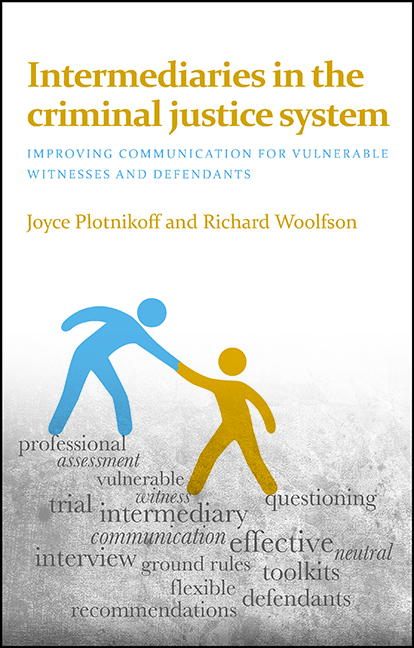 Intermediaries in the Criminal Justice System
Intermediaries in the Criminal Justice System Book contents
- Frontmatter
- Contents
- About the authors
- The Nuffield Foundation
- Acknowledgements
- Foreword
- one Introduction: a fresh pair of eyes
- two The intermediary scheme in England and Wales
- three Behind the scenes: planning to assess the witness
- four Assessment methods and involvement of the interviewer
- five Communication aids and stress reduction strategies
- six Contributing to the effectiveness of the police interview
- seven Negotiating professional space at the ground rules hearing
- eight Making the ground rules hearing effective
- nine ‘Every reasonable step’: preparation for giving evidence
- ten Cross-examination: research, case law, training and regulation
- eleven Cross-examination: intervention at trial
- twelve Cross-examination: challenges at the cutting edge
- thirteen The uneasy position of vulnerable defendants
- fourteen A new profession
- fifteen Conclusion
- References
- Index
- Table of cases
- Legislation
- Rules
- Practice directions
fourteen - A new profession
Published online by Cambridge University Press: 08 March 2022
- Frontmatter
- Contents
- About the authors
- The Nuffield Foundation
- Acknowledgements
- Foreword
- one Introduction: a fresh pair of eyes
- two The intermediary scheme in England and Wales
- three Behind the scenes: planning to assess the witness
- four Assessment methods and involvement of the interviewer
- five Communication aids and stress reduction strategies
- six Contributing to the effectiveness of the police interview
- seven Negotiating professional space at the ground rules hearing
- eight Making the ground rules hearing effective
- nine ‘Every reasonable step’: preparation for giving evidence
- ten Cross-examination: research, case law, training and regulation
- eleven Cross-examination: intervention at trial
- twelve Cross-examination: challenges at the cutting edge
- thirteen The uneasy position of vulnerable defendants
- fourteen A new profession
- fifteen Conclusion
- References
- Index
- Table of cases
- Legislation
- Rules
- Practice directions
Summary
Intermediaries have emerged as a new professional identity: there is surely potential now for a distinct professional qualification. (In South Africa, the Institute of Child Witness Research and Training plans to launch a university-level National Diploma for Intermediaries in 2015: communication from Karen Muller, November 2014.) Management structures have not kept pace: governance of registered intermediaries who work with witnesses is much as it was at the end of the pilot stage and intermediaries who work with defendants are not subject to regulation at all. The expanded intermediary role has not been evaluated but it seems evident that the system, in respect of services to both witnesses and defendants, is under enormous pressure. In relation to witness work alone, a shrinking pool of registered intermediaries has experienced a five-fold increase in demand over the last five years.
This chapter looks at feedback about the work of intermediaries. It also addresses concerns for future governance: for example, logic dictates that the same regulatory requirements should apply to intermediaries for witnesses and for defendants. It is anomalous for the Ministry of Justice to have oversight of an operational service. The viability of current arrangements must be in question because the Ministry is pulling back from active management of even the existing small pool of registered intermediaries. Key components of effective governance are considered, including monitoring, training, mentoring and supervision, quality assurance and capacity planning. Some possible reasons for the high turnover of intermediaries on the register are explored with a view to encouraging investment in retention. The chapter highlights problems relating to payment for intermediary services and concludes by discussing the potential for raising the profile of the role.
Feedback on intermediary performance
‘The intermediary has an important function in the interests of justice.’ (Judge)
‘At trial, an intermediary is now considered a vital link in the chain to ensure that a witness or defendant is best placed to give evidence.’ (Barrister)
This section summarises feedback in respect of intermediary work with witnesses and with defendants. Comments from criminal justice professionals are overwhelmingly favourable.
- Type
- Chapter
- Information
- Intermediaries in the Criminal Justice SystemImproving Communication for Vulnerable Witnesses and Defendants, pp. 281 - 302Publisher: Bristol University PressPrint publication year: 2015


